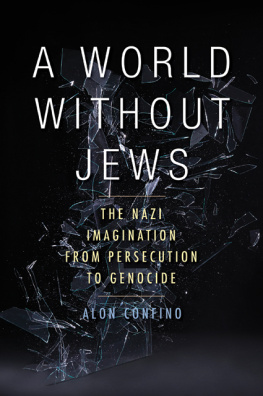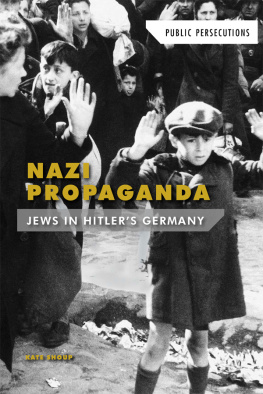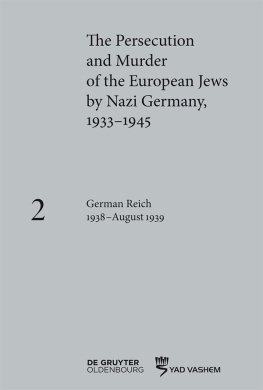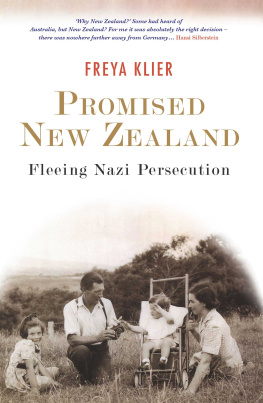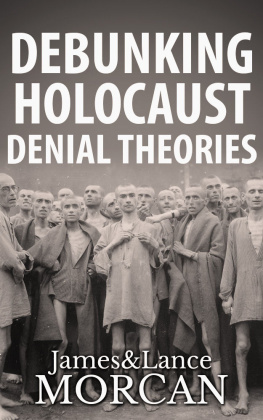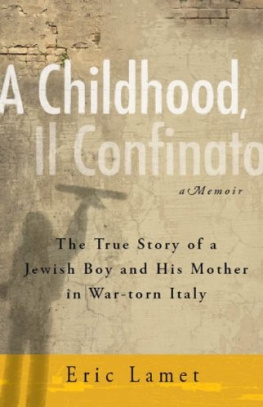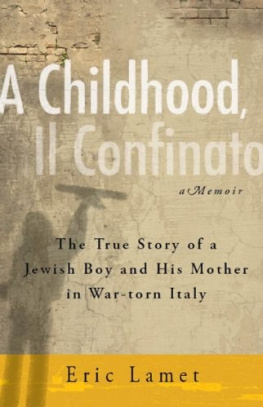Alon Confino - A World Without Jews: The Nazi Imagination from Persecution to Genocide
Here you can read online Alon Confino - A World Without Jews: The Nazi Imagination from Persecution to Genocide full text of the book (entire story) in english for free. Download pdf and epub, get meaning, cover and reviews about this ebook. City: New Haven, year: 2014, publisher: Yale University Press, genre: History. Description of the work, (preface) as well as reviews are available. Best literature library LitArk.com created for fans of good reading and offers a wide selection of genres:
Romance novel
Science fiction
Adventure
Detective
Science
History
Home and family
Prose
Art
Politics
Computer
Non-fiction
Religion
Business
Children
Humor
Choose a favorite category and find really read worthwhile books. Enjoy immersion in the world of imagination, feel the emotions of the characters or learn something new for yourself, make an fascinating discovery.
- Book:A World Without Jews: The Nazi Imagination from Persecution to Genocide
- Author:
- Publisher:Yale University Press
- Genre:
- Year:2014
- City:New Haven
- Rating:4 / 5
- Favourites:Add to favourites
- Your mark:
- 80
- 1
- 2
- 3
- 4
- 5
A World Without Jews: The Nazi Imagination from Persecution to Genocide: summary, description and annotation
We offer to read an annotation, description, summary or preface (depends on what the author of the book "A World Without Jews: The Nazi Imagination from Persecution to Genocide" wrote himself). If you haven't found the necessary information about the book — write in the comments, we will try to find it.
Alon Confino: author's other books
Who wrote A World Without Jews: The Nazi Imagination from Persecution to Genocide? Find out the surname, the name of the author of the book and a list of all author's works by series.
A World Without Jews: The Nazi Imagination from Persecution to Genocide — read online for free the complete book (whole text) full work
Below is the text of the book, divided by pages. System saving the place of the last page read, allows you to conveniently read the book "A World Without Jews: The Nazi Imagination from Persecution to Genocide" online for free, without having to search again every time where you left off. Put a bookmark, and you can go to the page where you finished reading at any time.
Font size:
Interval:
Bookmark:


Published with assistance from the Louis Stern Memorial Fund.
Copyright 2014 by Alon Confino. All rights reserved.
This book may not be reproduced, in whole or in part, including illustrations, in any form (beyond that copying permitted by Sections 107 and 108 of the US Copyright Law and except by reviewers for the public press), without written permission from the publishers.
Yale University Press books may be purchased in quantity for educational, business, or promotional use. For information, please e-mail (UK office).
Epigraph: Nathan Ausubel, ed., A Treasury of Jewish Folklore (New York, 1948), 17.
Printed in the United States of America.
Library of Congress Cataloging-in-Publication Data
Confino, Alon, author.
A world without Jews: the Nazi imagination from persecution to genocide / Alon Confino.
pages cm Includes bibliographical references and index.
ISBN 9780300188547 (hardback)
1. JewsGermanyHistory19331945. 2. JewsPersecutionsGermany. 3. Holocaust, Jewish (19391945)Germany. 4. GermanyPolitics and government19331945. 5. GermanyHistory19331945. 6. GermanyEthnic relationsHistory. I. Title.
DS134.255.C66 2014 940.53'18dc23 2013041276
A catalogue record for this book is available from the British Library.
This paper meets the requirements of ANSI/NISO Z 39.481992 (Permanence of Paper).
10 9 8 7 6 5 4 3 2 1
To Paolo and Davidi
and their worlds
A group of Nazis surrounded an elderly Berlin Jew
and demanded of him, Tell us, Jew, who caused the
war? The little Jew was no fool. The Jews, he
answered, then added, and the bicycle riders. The
Nazis were puzzled. Why the bicycle riders? Why
the Jews? answered the little old man.
A Jewish joke told during the Second World War
Contents
Illustrations
The synagogue in Euskirchen with the Torah scroll hanging from the roof, November 10, 1938
Acknowledgments
I have come to think that writing a history book has an affinity with playing music. A music piece has, in one sense, a strict narrative in the form of the notes that comprise it and cannot be changed. But each time the score is playedthat is, each time its story is toldit sounds a little bit different. Tightening and loosening of notes, slowing down or moving fast, disconnecting or linking the phrasesall these and others add up to a range of possible expressions and to different interpretations. History also has, in a sense, a strict narrative in the form of facts. Things have happened in the past, and we cannot change them (although, unlike in a musical composition, we may add new facts to the story as new archives are opened and new information is revealed). These facts are the building blocks of every historical narrative. But each time the historian crafts a story from the facts, it is a little bit different. He or she chooses different contexts, methods, or ways to relate cause and effectand the result is a different interpretation.
Much as the musician tries to capture the tone and sentiment of a given piece, the historian listens to people in the past, attempting to capture their values and motivations, the rhythms of their life, often broken amid contradictions, unpredictability, and the constraining structures of history. And much as there are different kinds of music, from the military march to jazz, so there are different kinds of history, from economic to cultural. Each, when properly done, tells us something different but valuable about music and about people in the past, about the musician and the historian, and sometimes, when touched by the beauty and grace of art, about ourselves.
What a pleasure it is to thank the friends and colleagues who shared with me their wisdom, criticism, and time as I worked on this project. Amos Goldberg shared with me his deep insights and friendship, which have enriched me. Paul Betts and Monica Black read the entire final manuscript, and I am very grateful for their comments and conversations over the years. Dan Stone read the first draft and shared with me his knowledge of Holocaust history and historiography. Mark Roseman shared with me his sagacity over many a conversation. Ilana Pardes, who read an earlier draft, encouraged me to continue thinking about Freud. Halfway through the project I had the good fortune to get to know Tom Kohut, whose insights on history and psychology have been important. I am equally thankful to Asher Biemann, Alexandra Garbarini, Jeffrey Grossman, Allan Megill, and Dirk Moses for their insights.
I am deeply grateful to the John Simon Guggenheim Memorial Foundation for a generous fellowship that jazzed up this project. I wrote the first draft of this book as a Visiting Fellow at the Department of History and Civilization of the European University Institute in Florence in 20092010. I thank Gerhardt Haupt and Bartolom Yun-Casalilla for making this possible and the members of the department for their gracious hospitality. A resident fellowship at the Institute for Advanced Studies in Culture at the University of Virginia in 20122013 allowed me to finish the book in a splendid environment. I am indebted to Jennifer Geddes, James Hunter, and Josh Yates. I am thankful to the University of Virginia for two summer research grants in 2011 and 2012 that helped me move the project along, and to the Dean of the College of Arts and Sciences and the Vice President of Research and Graduate Studies for a grant to defray photography costs.
I feel very fortunate for the gifted staff of Yale University Press who made the production of this book possible and for Laura Jones Dooley, who edited it with care.
I owe a tremendous amount to two people who believed in this project and provided constant attention and support. Will Lippincott, my agent, encouraged me throughout, and Jennifer Banks, my editor at Yale University Press, applied her splendid skills to the manuscript. It has been such a pleasure working with and befriending them.
The book is dedicated to my two most important worlds, to Paolo and Davidi.

Introduction
A Nazi Tale of Germans, Jews, and Time
S cenes of biblical fury combining audacity and transgression took place all across Germany.
The small town of Frth could be a tourist destination. Located just a few miles from Nuremberg, in northern Bavaria, it's a scenic medieval settlement of tall, spiky houses and red tiled roofs, with a town hall modeled on the Palazzo Vecchio in Florence. In the old town, around the Church of Saint Michael, stand buildings with adorned facades dating from the seventeenth and eighteenth centuries. The historic center nestles between the rivers Rednitz and Pegnitz; to the west of town, on the far side of the Main-Danube Canal, is the municipal forest, and to the north lies a fertile area known as garlic country.
At around 2 o'clock in the morning on Thursday, November 10, 1938, groups of local young males dressed in brown uniforms roamed the streets of Frth, knocking on the doors of their Jewish neighbors, classmates, and former friends. They entered the apartments, smashing furniture and objects, throwing possessions out the windows, and tearing books to shreds. Oskar Prager, then aged nine and a half, recalled that he saw the men take my books, tear them up and throw them around the room. They were not Hebrew books but standard German reading books which children had at the time.
Next pageFont size:
Interval:
Bookmark:
Similar books «A World Without Jews: The Nazi Imagination from Persecution to Genocide»
Look at similar books to A World Without Jews: The Nazi Imagination from Persecution to Genocide. We have selected literature similar in name and meaning in the hope of providing readers with more options to find new, interesting, not yet read works.
Discussion, reviews of the book A World Without Jews: The Nazi Imagination from Persecution to Genocide and just readers' own opinions. Leave your comments, write what you think about the work, its meaning or the main characters. Specify what exactly you liked and what you didn't like, and why you think so.

